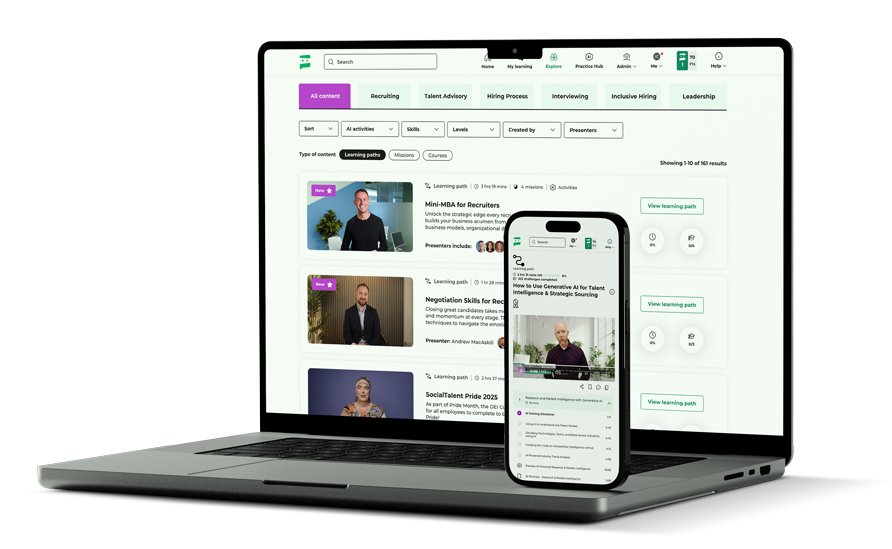
By Johnny Campbell
It’s July. We’re just over halfway through 2025. So I think it’s a good time to ask the question: what’s really going on in hiring right now?
I’ve spent the last six months on the road – from conference keynotes and boardroom breakouts to corridor conversations and late-night chats with TA leaders, recruiters, HRDs, vendors, analysts, and execs across Europe and the U.S.
What follows isn’t a hot take, a vague list of predictions, or another AI-generated “future of work” sermon. It’s a pulse check. A pattern I’ve seen emerge from real conversations with the people actually doing the work.
1. AI Is (Of Course) Everywhere
Not-so-spoiler-alert: Everyone’s talking about AI! Everyone’s buying AI tools. But fewer are deploying them meaningfully. And even fewer still have figured out the operational shift that should come with it.
The real conversation I’m hearing now is less “what can AI do?” and more “what does this mean for our people?” and “how can we best leverage this?”. Recruiters are being upskilled into talent advisors (where budgets allow) but if you’re not actively building that bridge – from manual recruiter to strategic partner – AI will do it for you.
Want a learning budget? It better say “AI” on the cover. Or tie directly to upskilling recruiters into advisors. Otherwise, good luck!
Learn more: What Happens to Hiring After Everything Goes AI?
2. Candidate Cheating Is Real – And It’s Scaling
This one went from fringe concern to boardroom priority in record time. Whether it’s AI-generated CVs or whispered Zoom coaching, leaders are worried – and rightly so.
What’s missing? A coordinated response to candidate cheating. Most orgs are reacting in silos, without cross-functional ownership. But smart teams are seeing the upside and adapting to what is quickly becoming a new normal: interview training, tech vetting, and process redesign are all getting fast-tracked – because now there is a real business risk.
We talked about it on the newsletter only a few weeks ago – jump in to get the full picture.
3. Volume Hiring Is Changing Overnight
The levers have shifted. Retail, hospitality, logistics – they’re hiring in bursts, but with new constraints: fewer job boards, and more local targeting.
What used to work, doesn’t. The best TA teams are treating volume hiring more like automated marketing than ops – personalization and candidate experience at scale, journey mapping, content that converts, hyper speed and efficiency. Everyone else is scrambling.
(Side note: we’ll dive into this at the next SocialTalent Live event. Click the link to secure your spot today!)
4. Skills-First Hiring Has Peaked And Settled into Reality
The hype has cooled. The billion-dollar taxonomies, the skills clouds, the endless rebrands – most of it overpromised, underdelivered.
But there’s still value. Skills-first hiring works best as a lens, not a law. It’s great for unlocking untapped talent pools and making hiring more inclusive. Just don’t expect it to solve every talent problem on its own. It’s not a silver bullet. More like a decent compass – useful, directional, but it won’t carry you up the mountain alone.
5. Hiring Managers Are Still Make-or-Break
The alarm bells are thankfully getting louder and louder around this topic. The hiring manager experience is still the bottleneck, the blindspot, and the biggest multiplier of TA effectiveness.
The twist in 2025? Leaders are finally acknowledging it. And they’re investing – in coaching, enablement, and structured interviewing. Not because it’s trendy, but because it’s now mission-critical to close the talent they need.
I wrote about this topic in-depth recently and the swathe of comments in support really highlighted how vital this pain-point still is. Great, invested, aligned hiring managers are a huge value-add, don’t overlook it.
6. The Economy Is Stable-ish – But No One Feels Safe
Markets may be up, but sentiment is certainly down. From tech to manufacturing, most orgs are holding their breath. Uncertainty – economic, political, geopolitical – has simply frozen decision-making.
Result? Most TA teams are in a period of stasis. No massive cuts, no big expansions. Just a lingering sense of: “We’ll see.” Except in healthcare, where hiring continues to surge. (But that’s not an economic signal – it’s just as a result of aging demographics.)
7. DEI Isn’t Dead – It’s Just Moved
The backlash made headlines. But beneath the surface, the focus has shifted – from people to process.
DEI in 2025 looks like this: less unconscious bias training, more AI audit trails. Less awareness campaigns, more system safeguards. Leaders are still fighting for fairness – they’re just fighting the algorithms now.
But really none of these executive orders should change the core of what inclusion is really about in the context of hiring, and that’s ensuring a fair, unbiased experience that allows the best people to succeed.
8. TA Leaders Are Being Squeezed And Repositioned
Here’s the quiet reshuffle: talent leaders are inheriting orphaned teams – L&D, internal mobility, onboarding – as other departments shrink. Sometimes by choice. Often by necessity.
Want to keep your seat? Say yes. That’s the career advice of the year. Be the person who steps up, who stretches, who stays relevant. And not just in TA, but across the business.
Because in a world of shrinking teams and growing complexity, the survivors aren’t just specialists. They’re integrators.
Final Thought
We hit “peak TA” two years ago. That’s not opinion – that’s fact. The question now isn’t “how do we get back there?” It’s “what do we do next?”
The best talent leaders I’ve met this year aren’t chasing headlines. They’re building resilient, flexible, tech-enabled teams – quietly, deliberately, relentlessly.
So if you’re feeling the pressure, you’re not alone. But if you’re leaning into it – reframing, reskilling, realigning – you’re already ahead of the curve.
Let’s see where the next six months take us.




